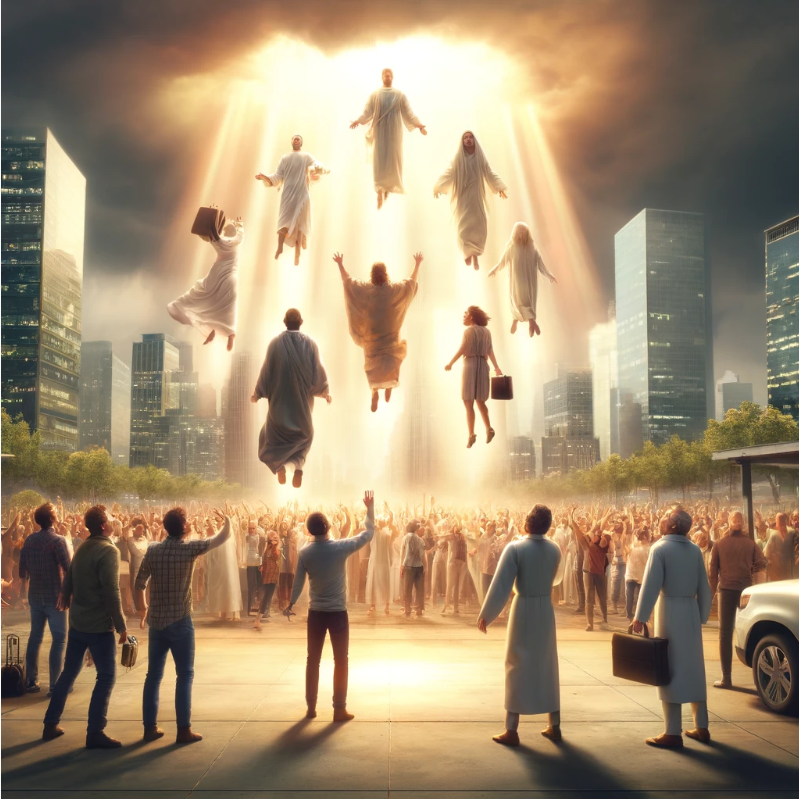
The concept of the Rapture, where believers are taken up to meet Christ in the air, is most explicitly discussed in 1 Thessalonians 4:16-17. Other references that are often associated with this event include Matthew 24:40-41 and 1 Corinthians 15:51-52.
1 Thessalonians 4:16-17
For the Lord himself shall descend from heaven with a shout, with the voice of the archangel, and with the trump of God: and the dead in Christ shall rise first:Then we which are alive and remain shall be caught up together with them in the clouds, to meet the Lord in the air: and so shall we ever be with the Lord.
1 Thessalonians 4:16-17
Matthew 24:40-41
Then shall two be in the field; the one shall be taken, and the other left. Two women shall be grinding at the mill; the one shall be taken, and the other left.
Matthew 24:40-41
1 Corinthians 15:51-52
Behold, I shew you a mystery; We shall not all sleep, but we shall all be changed, In a moment, in the twinkling of an eye, at the last trump: for the trumpet shall sound, and the dead shall be raised incorruptible, and we shall be changed.
1 Corinthians 15:51-52
What does the Bible teach us about the rapture and how should we interpret it?
The concept of the rapture is a significant and often discussed event among evangelical believers who uphold a deep respect and fear for God. It revolves around the belief that Jesus will return to gather His faithful followers to Heaven. This teaching is rooted in several passages in the Bible, which you’ve referenced.
Understanding the Rapture
In 1 Thessalonians 4:16-17, the Apostle Paul describes a dramatic scene: «the Lord himself shall descend from heaven with a shout, with the voice of the archangel, and with the trump of God.» This moment marks the beginning of the rapture, where believers understand that those who have died in Christ—that is, those who have remained faithful until their death—will rise first. Following this, those who are still alive and have kept their faith in Jesus will be «caught up together with them in the clouds» to meet the Lord in the air. This meeting in the skies is a poignant symbol of eternal unity with Christ, emphasizing that believers will always be with the Lord.
In Matthew 24:40-41, Jesus provides a simple yet profound illustration of the rapture’s unexpected nature. He mentions that two people will be doing everyday activities—one will be taken and the other left. This distinction highlights the suddenness and selective nature of the rapture, underscoring the importance of being prepared at all times, living in a manner that aligns with God’s will.
1 Corinthians 15:51-52 introduces the rapture as a mystery, something that was not fully understood before New Testament times. This passage explains that not everyone will experience death; instead, there will be a transformation «in a moment, in the twinkling of an eye.» At the sound of the last trumpet—a signal of divine authority and the final call—believers will be changed. Their mortal bodies will be replaced with immortal ones, free from corruption and sin, signifying a complete and eternal redemption.
Interpreting the Rapture
For believers, these passages serve not only as a promise but also as a call to live righteously. The anticipation of the rapture is meant to influence daily life, encouraging individuals to focus on their spiritual health and readiness. The suddenness of this event, as described in the Scriptures, teaches that vigilance and faithfulness are crucial.
The imagery used in these verses—shouts, trumpets, and celestial gatherings—speaks to the grandeur and majesty of God’s final plan for His followers. It’s a vision meant to inspire hope and awe, reinforcing the belief in a life beyond this world, forever in the presence of God.
In your walk of faith, these teachings about the rapture can be a source of comfort and motivation. They remind us of the impermanence of our current struggles and the infinite joy that awaits those who are steadfast in their love and commitment to God.
